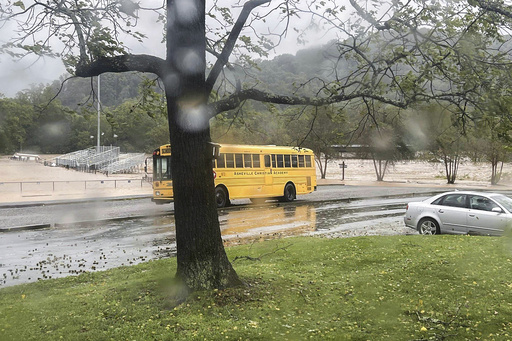Tens of thousands of students across the Southeast are facing significant disruptions to their education following the devastation caused by Hurricane Helene. The hurricane inflicted severe damage on homes, educational institutions, and local infrastructure, leaving some districts unsure of when they will be able to resume classes.
Although virtual learning played a crucial role during the COVID-19 pandemic, it is not a viable option in this case due to ongoing issues with internet and cellphone connectivity, which have remained inconsistent since the storm hit in late September. In particularly affected areas like western North Carolina, school officials warn that students may not return to classrooms for up to a month, while others are still uncertain about a reopening timeline.
Marissa Coleman, a mother of four, has opted to send her children to stay with relatives in Texas, as their home in Buncombe County, North Carolina, currently lacks running water. She remarked, “A month feels like a lot, but it’s not insurmountable. However, as we approach Thanksgiving and Christmas, I begin to wonder how they will catch up.”
In Buncombe County, the hurricane caused widespread destruction, taking down homes, disrupting power supplies, and critically damaging the water system in Asheville, a city with around 94,000 residents. The storm resulted in at least 246 fatalities throughout the Appalachian region, complicating cleanup efforts due to ruined bridges and highways. Helene marked itself as the deadliest hurricane to strike the U.S. mainland since Hurricane Katrina in 2005.
The Buncombe County School District, which caters to more than 22,000 students, announced on Tuesday via their Facebook page that no decisions regarding the start date or daily schedule have been finalized due to the need for extensive repairs and the restoration of communication and safety systems.
Educational leaders express concern that the disruption may have serious implications for both learning and mental health. Research indicates that children affected by natural disasters are at an increased risk for acute health issues, as well as symptoms of anxiety and depression. These impacts can hinder academic progress, as absenteeism poses a threat to achievement, compounded by trauma affecting cognitive function.
These challenges emerge alongside rising worries about the repercussions of climate change on education. Numerous communities have experienced wildfires displacing residents, while some schools lacking adequate heating or cooling measures have closed during extreme weather conditions. According to the World Bank, last year, around 400 million children were affected by school closures related to climate events.
In the aftermath, schools impacted by Hurricane Helene are seeking to provide stability. The Buncombe district has encouraged families to share books within their neighborhoods and engage their children in writing about their feelings or experiences during this time. They also suggested using everyday activities to create math problems for learning purposes.
Cécile Wight, a mother from Asheville, shared her appreciation for the support shown by schools, including well-being surveys and a bus driver visiting students personally despite the challenges. “Having this level of emotional support from the school community means a lot to us,” she expressed.
However, uncertainty persists. Wight’s family is fortunate to stay in their home thanks to having access to well water, but many families are still unable to return after evacuating. As of Tuesday, most of Buncombe’s 45 schools continued to lack running water, which poses challenges for meeting basic safety and hygiene requirements.
Schools are exploring the feasibility of reopening despite the water issues, possibly relying on portable restroom facilities. In a letter to families, Asheville Superintendent Maggie Furman mentioned the possibility of drilling wells at schools to regain independence from city water supply.
Coleman mentioned her children’s eagerness to find a semblance of normal life again. “I understand the need for schools to take their time to ensure safety, and I completely support that. Still, I don’t believe we should wait until everything returns to normal before we open. That could take too long,” she stated.
The Tennessee Department of Education is also assessing the situation, trying to ascertain how many schools remain closed or have sustained major damage following Hurricane Helene.
As the impact of the storm reverberates, several schools in Tennessee have had to postpone popular events such as homecoming games and parades. Additionally, many colleges are extending application deadlines to alleviate pressure on high school seniors.
In other severely affected areas, there are fears that some early childhood education centers may never reopen. According to Militza Mezquita, an advisor on education in emergencies at Save the Children, private childcare centers are particularly susceptible after disasters due to their already precarious operational margins. A natural disaster can result in a closure of 10% to 20% of these facilities, further complicating recovery efforts. Mezquita emphasized the importance of childcare in recovery, as those vital to rebuilding—such as road crews and healthcare workers—often have young children that require supervision.
Even amid the turmoil, educators like Heather Smith, who gained recognition as North Carolina’s Teacher of the Year this past spring, urge families to find teachable moments in the aftermath of such storms. She has involved her two young children in community efforts, demonstrating resilience and the value of service. “Our kids are learning valuable lessons about adversity and community support every day,” she remarked.
Likewise, Wight has taken her children to volunteer at relief initiatives within schools, allowing them to feel a sense of involvement. “If nothing else, COVID taught us that we can adapt to challenges. The kids are resilient, and I believe they will eventually catch up academically,” she concluded.
